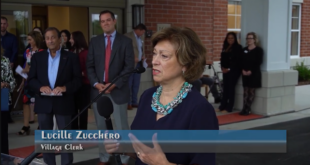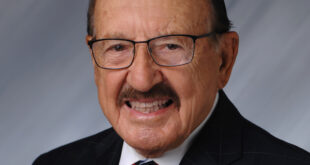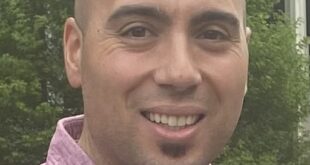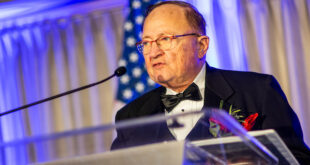As dean of the DePaul University School of Music, Dr. Ronald Caltabiano brings the passion and expertise of a master musician and composer.
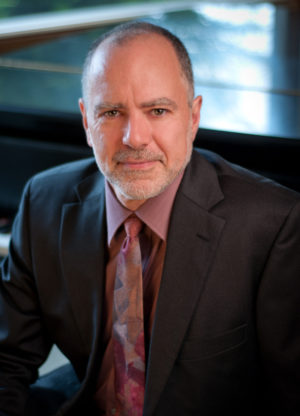 With a grand sweep of his right hand befitting a triumphant conductor, Dr. Ronald Caltabiano gestures to the glorious curves that grace the Holtschneider Performance Center at the DePaul University School of Music. Architectural glissandos ring out everywhere, including the upper-level overhangs that hug 500-seat Gannon Concert Hall and the church-like windows that look out onto the Chicago campus. The building hums with a palpable energy that seems to quicken his step.
With a grand sweep of his right hand befitting a triumphant conductor, Dr. Ronald Caltabiano gestures to the glorious curves that grace the Holtschneider Performance Center at the DePaul University School of Music. Architectural glissandos ring out everywhere, including the upper-level overhangs that hug 500-seat Gannon Concert Hall and the church-like windows that look out onto the Chicago campus. The building hums with a palpable energy that seems to quicken his step.
But while DePaul’s music school dean is charged with overseeing this $98 million, 185,000-square-foot jewel, he could pass for an instructor or perhaps even a grad student, such is his exuberance. On this spring afternoon, he’s carrying around a large bound score dappled with a rainbow of sticky notes (his own orchestral composition, “Concertini”), all the while chatting up students, teachers and staff with warm, winning informality. You might never guess that Caltabiano is a three-time graduate of The Julliard School and a lauded composer whose works have been played all over the world, earning praise as “a remarkable synthesis of modernism and romanticism, of violence and lyricism, of integrity and accessibility.”
Where does a life of such artistic accomplishment find its opening notes? To hear Caltabiano tell it, the genesis came in the company of his Italian grandfather. The musician, composer, mentor and administrative visionary sat down with Lou&A to talk about the path that brought him to DePaul, his lifetime in music and how his Italian lineage shaped his success.
Lou&A: Tell us about your Italian roots.
Dr. Ronald Caltabiano: My father was born in Sicily in Catania and my mother was orphaned at a very early age, but we know that her father was from southern Germany and her mother was Genovese. I was born in Brooklyn; we lived in Long Island, and by the time I was 17, I moved to Manhattan.
Lou&A: How did your upbringing influence your musical life?
Caltabiano: There was always music in the home and a piano as almost any family had in the ’60s. My father dabbled on the piano and had a terrible voice; my mother didn’t play and had a gorgeous voice. But what I remember most were Saturday afternoons at my grandfather’s knee, listening to the Metropolitan Opera broadcasts.
Lou&A: What made those times so special?
Caltabiano: He’d listen every Saturday without fail. At first I didn’t understand because he would sit there, close his eyes and weep. Classical music didn’t have a deep meaning for me at that point. My grandfather died when I was 14 and by that time I had at least nine years at his knee, listening to opera. I will never, ever forget that. That was what put the fire inside of me and spurred my love of the art form.
Lou&A: You’ve written for symphonies in San Francisco, Dallas, Cincinnati and London for the BBC. You’ve won awards from the American Academy of Arts and Letters, the Guggenheim Foundation and the Rockefeller Foundation. When you’re doing that work, what is your artistic process like?
Caltabiano: I think about a piece in the largest dramatic scale: What do I want the entire piece as a whole to express? And then I spend a lot of time thinking about the techniques that can make that happen. I craft a plan and once that plan is down, then I can compose. Sometimes that means following the plan and sometimes that means stomping the hell out of it and diverging a great deal.
If you always do what the listener expects, you’re not informing them or evoking something powerful. But if you build that expectation, thwart it, and in denying it give them something that is so right [sighs] — then you’ve done something.
Lou&A: And yet somewhere along the line you were drawn to the academic world and teaching. How did that happen?
Caltabiano: I was pulled kicking and screaming. I had determined fairly early in my career that I did not want to teach because too many composers went into teaching and stopped composing. But my friend Gideon Waldrop asked me to come in and teach one class — just one — at the Manhattan School of Music. [Waldrop served for 24 years as Juilliard’s dean.] And I got the bug. It felt good to be around students who were so eager to learn. And it got me out of the studio.
As I taught more and more, I became curious about the bigger picture: not ‘How am I going to teach that student about 18th-century counterpoint?’ but what teaching, and teaching in the arts, meant. I spent 15 to 20 years in institutions where I was collaborative with people in many arts. That desire to see the bigger and bigger picture led me ultimately to administration. Two things were going on. When I was in my mid-40s I wanted to stop composing — and I did for 12 years or so. So I had more time on my hands. I didn’t know I wanted to go into administration then but found that my creative energy could be used for a bigger purpose.
Lou&A: Being in this environment — even as the dean — you have an excitement that reminds me a lot of a student. How has DePaul been good for you musically?
Caltabiano: Last year, I started composing again. And I have a very different outlook. When I was a young composer, people thought I was going to be a star so every time I sat down to write there was all kinds of pressure. Now I don’t give a damn. I just write music I want to write.
Lou&A: What’s been done here is incredible: performance spaces flooded with light and boasting pristine acoustics, a state-of-the-art recording studio and inviting teaching spaces. It’s beautiful and inspiring. But there’s one telling detail I love about the rehearsal areas.
Caltabiano: When you walk through the hallways, what do you hear? Music! It’s meant to leak into the halls from the doors because that’s what you should hear when you’re in a stimulating, creative place like this. I’ve been to other schools where the hallways were soundproof — and walking the building felt dead. This place is full of life.
Lou&A: Of the many other things that make DePaul’s music school special, what gets you especially excited?
Caltabiano: It’s a great school and an unknown school in too many ways. Once people around the country and internationally know about the quality we have here, there’s no stopping this place.
It’s also the spark in a student’s eye, when they ‘get’ something. [Pauses.] Watching a group of DePaul faculty come together to figure out the best path for a student. And I’ve got to say, working with administrators who know what arts are for. The arts are for enrichment of the entire world, and at a university like DePaul, the arts can be a shining star.
To learn more about the DePaul School of Music, click here. To learn more about Dr. Ronald Caltabiano, click here.
The above appears in the June 2019 issue of the print version of Fra Noi. Our gorgeous, monthly magazine contains a veritable feast of news and views, profiles and features, entertainment and culture. To subscribe, click here.
 Fra Noi Embrace Your Inner Italian
Fra Noi Embrace Your Inner Italian



